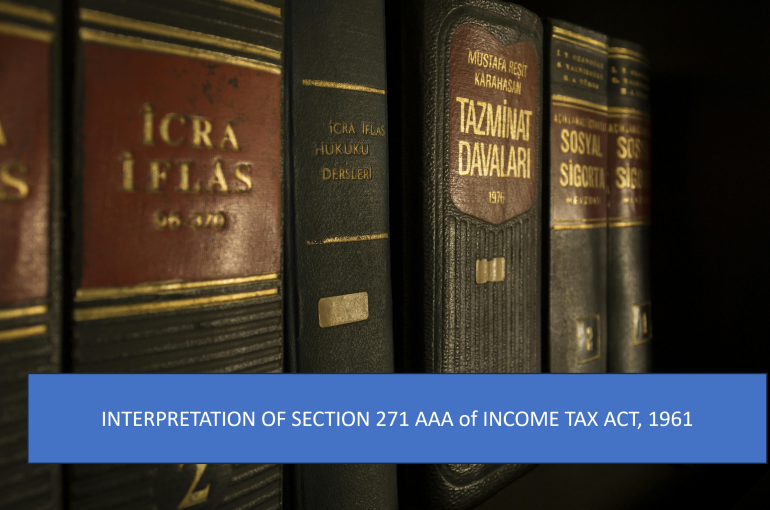INTERPRETATION OF SECTION 271 AAA of INCOME TAX ACT, 1961
A Division Bench of the Hon’ble Supreme Court comprising of Justice Manmohan and Justice J.B. PARDIWALA passed a judgment dated February 13, 2025 in case of K.Krishna Murthy vs. Deputy Commissioner of Income Tax Civil Appeal No. 2411 of 2025 which arose by Special leave Petition (C) No. 943 of 2023 wherein the Bench interpreted Section 271 AAA (1)[1] of Income tax Act 1961. The Section deals with levy of penalty on undisclosed income. Section 271AAA (2)[2] of the Act 1961 lays down three exceptions of the applicability of Section 271AAA (1). The Special Leave Petition has been filed challenging the impugned Judgment and Order dated 02nd August, 2022 passed by the High Court of Karnataka at Bengaluru.
FACTS-
- The issue began from 19th January 2009 wherein transactions for procuring lands at a certain price from the land procurers, i.e. the Appellant and Mr. Surendra Reddy were made. Reimbursement was claimed in this transaction.
- Thereafter on 25th November, 2010, a search and seizure operation was carried out at the Appellant’s premises under Section 132 of the Act 1961 wherein the Appellant disclosed an income of Rs.2,27, 65,580/- and returned a total income of Rs.4,77,11,330/- for Previous Year 2010- 2011, relevant to AY 2011-2012. In respect to Section 139(1) of the Act 1961, the due date for filing return of income for accounting year 2010-2011 expired on 31st July, 2010. The Respondent assessed the total income as Rs.4,78,02,616/-. The assessee has presented an amount of Rs.2,49,90,000/- during the course of assessment proceedings under the head income from other sources i.e. income from assignment of rights being the difference between the cost of lands which he has acquired cost at which it got transferred.”
- On 30th September, 2013, the Respondent imposed penalty on the Appellant under Section 271AAA of the Act 1961 solely on the ground that the Appellant did not make payment of tax and penalty considering the entire received income as the undisclosed income. On that very same day, another order imposing penalty under Section 271AAA of the Act 1961 was passed in respect of accounting year 2010-2011. Penalty at the rate of 10% (Ten per cent) was imposed on the entire returned income i.e. Rs.4,78,02,616/-amounting to Rs.47,80,261/-
ISSUES:
“1. Whether it is necessary to comply with all the three conditions mentioned in Subsection (2) of Section 271AAA?
2. Whether penalty prescribed @ 10% of undisclosed Income under Section 271AAA of the Act can be reduced if the tax together with interest on the undisclosed income as declared by the Assessee in the course of search in a statement under Section 132(4) is to some extent complied with, with a delay, in the absence of specific period for such compliance specified in the Section 271AAA (iii) of the Act?”
Court’s Reasoning
1. Expression “ Undisclosed Income”
The Court held that as Section 271AAA is a penalty provision, it has to be strictly construed. As the onus to prove undisclosed income lies on Assessing officer, it is obligatory on the part of the Assessing Officer to demonstrate and prove that undisclosed income of the specified previous year was found during or as a result of the search.
2. Expression “ Specified Previous Year”
That as the search was conducted on 25th November, 2010 applicable and the year for filing returns under Section 139(1) of the Act 1961 which ended prior to that date had expired on 31st July, 2010 Consequently, by virtue of Explanation b(ii), AY 2011-12 (the year in which the search was conducted) is the specified previous year in the present case for the principle of Section 271AAA (1) of the Act 1961.
3. Found in the “course of Search”
The Court interpreted “found in the course of search” means documents found in assessee’s premise, search of another individual and further investigation of third parties.
DECISION OF SUPREME COURT
Since the income of Rs.2,49,90,000/- constitutes undisclosed income found during the search, penalty under Section 271AAA(1) of the Act 1961 is leviable on the said amount. Also, as the said amount was not admitted in the declaration before the investigating authority during the course of search but was disclosed by the Appellant only during the assessment proceedings, This court is of the view that the exception carved out in Section 271AAA (2) is not attracted to the said portion of the income. The present appeal is disposed of with a direction to the Appellant to pay penalty at the rate of 10% on Rs.2,49,90,000/- and not Rs.4,78,02,616/-
TRISHA SAXENA
SENIOR ASSOCIATE
THE INDIAN LAWYER AND ALLIED SERVICES
Please log on to our YouTube channel, The Indian Lawyer Legal Tips, to learn about various aspects of the law. Our latest video, titled; “Special Law Vs. General Law” can be viewed at the link below:
[1] Section 271(1)The Assessing Officer may, notwithstanding anything contained in any other provisions of this Act, direct that, in a case where search has been initiated under section 132 on or after the 1st day of June, 2007, the assessee shall pay by way of penalty, in addition to tax, if any, payable by him, a sum computed at the rate of ten per cent of the undisclosed income of the specified previous year.
[2] Section 271AAA(2) of the Act 1961 stipulates that Section 271AAA(1) shall not be applicable if the assessee–(i) in a statement under sub-section (4) of Section 132 in the course of the search, admits the undisclosed income and specifies the manner in which such income has been derived; (ii) substantiates the manner in which the undisclosed income was derived; and (iii) pays the tax, together with interest, if any, in respect of the undisclosed income





































Leave a Reply